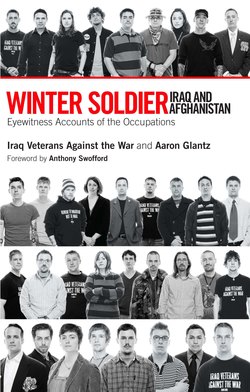Читать книгу Winter Soldier: Iraq and Afghanistan - Aaron Glantz - Страница 12
На сайте Литреса книга снята с продажи.
ОглавлениеJason Washburn
Corporal, United States Marine Corps, Rifleman
Deployments: March 19, 2003–September 11, 2003, al-Hilla;
May 27, 2004–February 6, 2005, Najaf;
September 6, 2005–March 31, 2006, Haditha
Hometown: San Diego, California
Age at Winter Soldier: 28 years old
During the course of my three tours, the Rules of Engagement changed a lot. It seemed like every time we turned around we had different Rules of Engagement, and they told us the reasons they were changing them was because it depended on the climate of the area at the time and what the threat level was. The higher the threat the more viciously we were permitted and expected to respond.
For example, during the invasion we were told to use target identification before engaging anyone, but if the town or the city that we were approaching was a known threat, if the unit in the area before us took a high number of casualties, we were allowed to shoot whatever we wanted. It was deemed to be a free-fire zone, so we opened fire on everything, and there was really no rule governing the amount of force we were allowed to use on targets during the invasion.
I remember one woman walking by. She was carrying a huge bag, and she looked like she was heading toward us, so we lit her up with the Mark 19, which is an automatic grenade launcher, and when the dust settled, we realized that the bag was full of groceries. She had been trying to bring us food and we blew her to pieces.
After the invasion ended and Bush declared “Mission Accomplished,” the rules changed pretty drastically. Instead of actually firing, we used a lot of close-combat, hand-to-hand violence to subdue people. There were a lot of times when we were on foot patrols we were ordered not to allow people to pass through our patrol formation, and unsuspecting villagers tried to pass through or cut through our formation, and we would butt-stroke them, jab them with our muzzles, or kick them just to get them out of our formations.
Another time there was a guy on a bicycle with a basketful of groceries who tried to just ride through our formation. We clothes-lined him and smashed up his bicycle. For what? Passing through our patrol formation? This is what we were expected to do.
On another mission, we were ordered to guard a fuel station. At the end of the day, when we were about to take off, a bunch of Iraqis rushed to the fuel pumps to try to take some fuel. Our squad leader called it in, and the response over the radio was, “What do you think we want you to do? Go fuck them up!” So we jumped off the trucks and charged at the Iraqis, and beat the hell out of them with rifles, fists, feet, anything we had available. Once they had either fled or were broken and bleeding, unconscious on the ground, we mounted back up in our trucks and left. We were never told to detain anyone or question anyone, just mess them up.
Most of the innocents that I actually saw get killed were behind the wheel of a vehicle, usually taxi drivers. I’ve been present when almost a dozen taxi drivers got killed just driving.
During my third deployment, there was a rule in place where all Iraqi traffic had to pull off of the road to let military convoys pass. If they didn’t comply, or if somebody got back on the road too early, they would get shot up. If they approached a checkpoint too fast, or too recklessly, they would get shot up.
Often we were told to be on the lookout for vehicle-borne IEDs (VBIEDs)—Improvised Explosive Devices (IEDs)—matching the description of every taxi in Iraq. We were to be on the lookout for any car that has orange-paneled doors and a front that’s white. That’s what every taxi in Iraq looks like, and these are the cars that could be VBIEDs. Quite a few of those guys got shot up just because their car looked like the cars we were told to look out for.
In another instance, the mayor of a town near Haditha was shot. Our command gathered the whole company together, and we were shown pictures of all of this. They had pictures of what everything looked like. There was a really nice, tight shot-group in the windshield, and the command announced that this is what good marine shooting looks like, and that was the mayor of the town. It was my squad that was tasked with apologizing to the family and paying reparations. All we did was go there and give them some money and then leave. It was really a joke.
Something else we were encouraged to do, almost with a wink and nudge, was to carry drop weapons, or by my third tour, drop shovels. We would carry these weapons or shovels with us because if we accidentally shot a civilian, we could just toss the weapon on the body, and make them look like an insurgent. By my third tour, we were told that if they carried a shovel or a heavy bag, or if they were seen digging anywhere, especially near roads, that we could shoot them. So we carried these tools and weapons in our vehicles in case we accidentally shot an innocent civilian. We could just toss it on there and be like, “Well, he was digging. I was within the Rules of Engagement.” This was commonly encouraged, but only behind closed doors. There obviously wasn’t a public announcement, but it was pretty common. That’s all I have to say.
